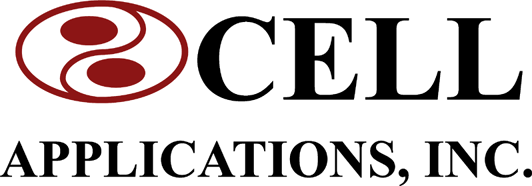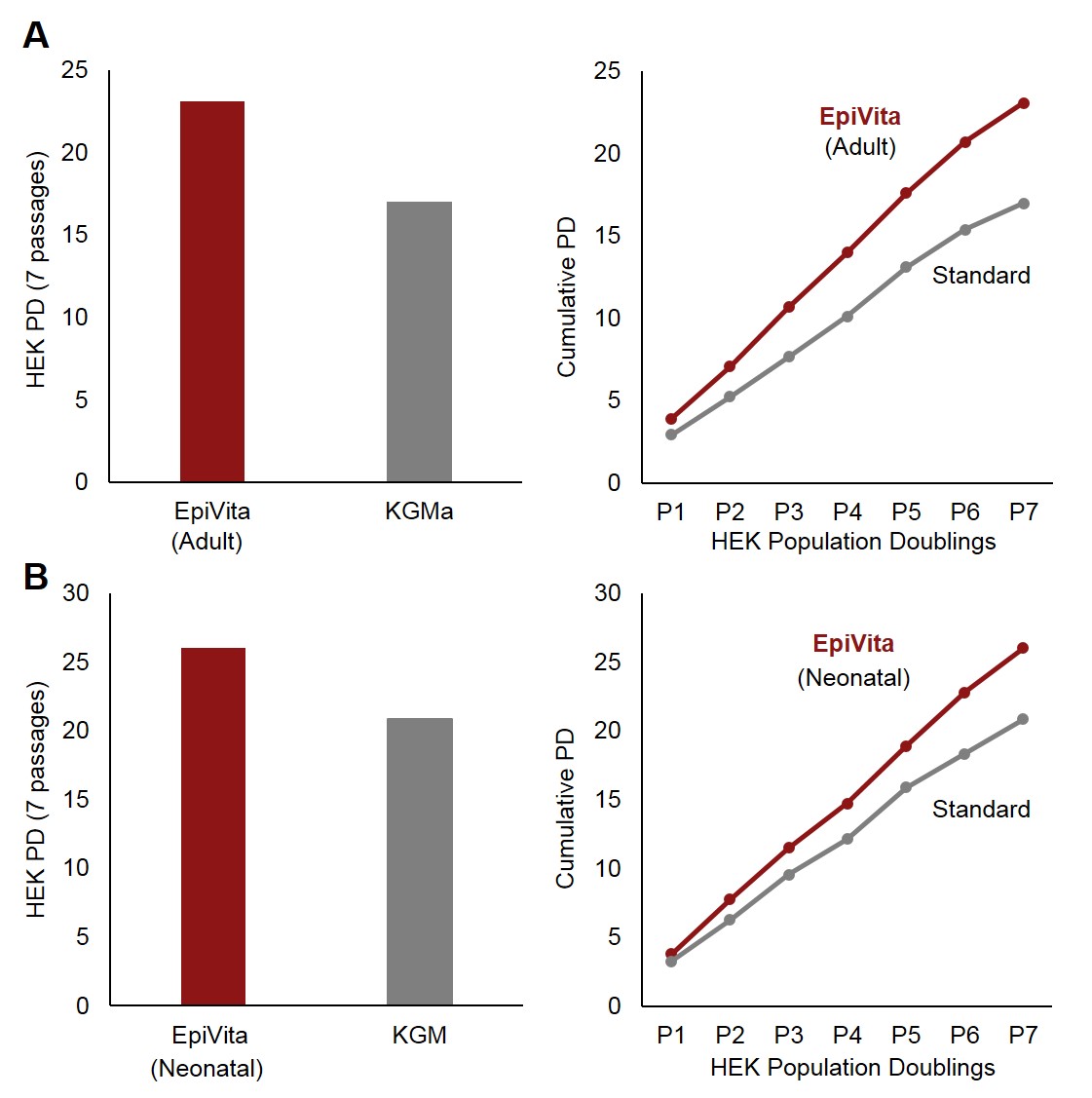MSDS 140-500
MSDS 141-500
MSDS 141-500a
MSDS 141-GS
MSDS 141-GSa
MSDS 141DGM-500
MSDS 141DGM-GS
MSDS 141DGMK-500
MSDS 141K-500
MSDS 141XF-500
MSDS 141K-500a
MSDS 141XF-GS
Description
This top-performing media, available only from Cell Applications, outperforms competitor formulations by a wide margin. Manufactured in a GMP certified facility, EpiVita is an ideal choice for fundamental life science studies, pharmaceutical drug discovery & toxicity assays, and translational research aimed at taking discoveries from the bench to the clinic.
Use EpiVita Basal Medium, Growth Medium & GM Kit with
In addition to Keratinocytes...
EpiVita Basal Medium also supports Epithelial Cells*
*When their respective growth supplements are added
Details
Human EpiVita Media provides an excellent research tool to study epidermal and epithelial cell biology in a serum-free culture environment. EpiVita greatly extends the in vitro lifespan of both neonatal and adult Human Epidermal Keratinocytes (HEK). This increase exceeds other commercially available, serum-free media while maintaining excellent cell morphology. HEK grown in EpiVita retain a more homogeneous phenotype, consisting of small refractile cells with minimal enlargement. When grown in EpiVita media, the most highly optimized formulation in its class, our HEK can be cultured through 20 population doublings for adult cells and 25 for neonatal cells.
When combined with specific growth supplements, EpiVita Basal Medium also provides excellent culture conditions for a wide variety of epithelial cells. This robust and versatile basal medium is animal origin-free, and contains essential & non-essential amino acids, vitamins, other organic compounds, trace minerals and inorganic salts.
CAI media are tested for sterility in order to confirm no bacteria, yeast or fungi contaminate the solutions. The products undergo further quality control for correct pH, osmolality and lack of endotoxins. A panel of different bioassays affirm the media sustain a proper environment for expected cell-type-specific culture, growth, plating, karyotype, physiology, morphology, viability, population doublings, surface markers, cryopreservation, differentiation and/or induction.
Laboratory research use only (RUO). Not for human, clinical, diagnostic or veterinary use.
Products
| Product | Size | CAT.# | Price | Quantity |
|---|---|---|---|---|
| Human EpiVita Serum-Free Growth Medium for Adult Cells: All-in-one ready-to-use, standard Epithelial Cell Medium, for adult cells. Does not contain FBS. | Size: 500 ml | CAT.#: 141-500a | Price: $127.00 | |
| Human EpiVita Serum-Free Growth Medium Kit for Adult Cells: Basal medium & growth supplement sold together packaged separately, for adult cells. Does not contain FBS. | Size: Yields 500 ml | CAT.#: 141K-500a | Price: $140.00 | |
| Human EpiVita Serum-Free Growth Supplement for Adult Cells: Added to Basal Medium to create Growth Medium, for adult cells. Does not contain FBS. | Size: 5 ml | CAT.#: 141-GSa | Price: $64.00 | |
| Human EpiVita Serum-Free Growth Medium for Neonatal Cells: All-in-one ready-to-use, standard Epithelial Cell Medium, for neonatal and fetal cells. Does not contain FBS. | Size: 500 | CAT.#: 141-500 | Price: $121.00 | |
| Human EpiVita Serum-Free Growth Medium Kit for Neonatal Cells: Basal medium & growth supplement sold together packaged separately, for neonatal and fetal cells. Does not contain FBS. | Size: Yields 500 ml | CAT.#: 141K-500 | Price: $134.00 | |
| Human EpiVita Serum-Free Growth Supplement for Neonatal Cells: Added to Basal Medium to create Growth Medium, for neonatal and fetal cells. Does not contain FBS. | Size: 5 ml | CAT.#: 141-GS | Price: $59.00 | |
| Human EpiVita Basal Medium: Basal medium (contains no growth supplement). Add GS before use. | Size: 500 ml | CAT.#: 140-500 | Price: $96.00 | |
| Human EpiVita Defined Growth Medium: All-in-one ready-to-use | Size: 500 | CAT.#: 141DGM-500 | Price: $121.00 | |
| Human EpiVita Defined Growth Medium Kit: Basal medium & growth supplement sold together packaged separately | Size: Yields 500 ml | CAT.#: 141DGMK-500 | Price: $133.00 | |
| Human EpiVita Defined Growth Supplement: Added to Basal Medium to create Growth Medium | Size: 5 ml | CAT.#: 141DGM-GS | Price: $61.00 | |
| Human EpiVita Xeno-Free Growth Medium: All-in-one ready-to-use | Size: 500 ml | CAT.#: 141XF-500 | Price: $122.00 | |
| Human EpiVita Xeno-Free Growth Medium Kit: Basal medium & growth supplement sold together packaged separately | Size: Yields 500 ml | CAT.#: 141XFK-500 | Price: $133.00 | |
| Human EpiVita Xeno-Free Growth Supplement: Added to Basal Medium to create Growth Medium | Size: 5 ml | CAT.#: 141XF-GS | Price: $61.00 |
Related Products
| Product | Size | CAT.# | Price | Quantity |
|---|---|---|---|---|
| Freezing Medium: For general cryopreservation of most primary cells. Contains FBS & DMSO. | Size: 50 ml | CAT.#: 040-50 | Price: $54.00 | |
| Subculture Reagent Kit: 100 ml each of HBSS, Trypsin/EDTA & Trypsin Neutralizing Solution | Size: 1 Kit | CAT.#: 090K | Price: $69.00 | |
| Human EpiVita Serum-Free Growth Medium for Adult Cells, without Antibiotics: All-in-one ready-to-use, standard Epithelial Cell Medium, for adult cells. Does not contain FBS or Antibiotics. | Size: 500 ml | CAT.#: 141A-500a | Price: $140.00 | |
| Human EpiVita Serum-Free Growth Medium Kit for Adult Cells, without Antibiotics: Basal medium & growth supplement sold together packaged separately, for adult cells. Does not contain FBS or Antibiotics. | Size: Yields 500 ml | CAT.#: 141AK-500a | Price: $152.00 | |
| Human EpiVita Serum-Free Growth Medium for Neonatal Cells without Antibiotics: All-in-one ready-to-use, standard Epithelial Cell Medium, for neonatal and fetal cells. Does not contain FBS or Antibiotics. | Size: 500 ml | CAT.#: 141A-500 | Price: $134.00 | |
| Human EpiVita Serum-Free Growth Medium Kit for Neonatal Cells, without Antibiotics: Basal medium & growth supplement sold together packaged separately, for neonatal and fetal cells. Does not contain FBS or Antibiotics. | Size: Yields 500 ml | CAT.#: 141AK-500 | Price: $145.00 |
Resources/Documents
Citations
Publications
2016
Tanihara, M., K. Takaichi, M. Maeda, T. Mitsui, K. Yamamoto and A. Hirano. 2016. Retinol-modified collagen, method for producing same, and external composition for skin containing same. Patent US 9238688 B2.
Wang, A., C. Swinford, A. Zhao, E. Ramos, R. Gregory and M. Srinivasan. 2016. A Case-Control Study to Determine the Prognostic Features of Salivary Epithelial Cells in Periodontitis. JDR Clinical & Translational Research, 1:256-265:
2015
Wages, P., K. Lavrich, Z. Zhang, W. Cheng, E. Corteselli, A. Gold, P. Bromberg, S. Simmons and J. Samet. 2015. Protein Sulfenylation: A Novel Readout of Environmental Oxidant Stress. Chemical Research in Toxicology, DOI: 10.1021/acs.chemrestox.5b00424.
2014
Wages, P., R. Silbajoris, A. Speen, L. Brighton, A. Henriquez, H. Tong, P. Bromberg, S. Simmons, and J. Samet. 2014. Role of H2O2 in the oxidative effects of zinc exposure in human airway epithelial cells. Redox Biology, 3:47–55.
2012
Niccoli, S. 2012. The carcinogenic properties of naturally occurring human papillomavirus 16 E6 oncogene variants. Lakehead University, PhD dissertation.
Niccoli, S., S. Abraham, C. Richard, and I. Zehbe. 2012. The Asian-American E6 variant protein of human papillomavirus 16 alone is sufficient to promote immortalization, transformation, and migration of primary human foreskin keratinocytes. Journal of virology. 86:12384-12396.
DiNatale, B.C., K. Smith, K. John, G. Krishnegowda, S.G. Amin, and G.H. Perdew. 2012. Ah receptor antagonism represses head and neck tumor cell aggressive phenotype. Molecular Cancer Research. 10:1369-1379.
2011
Tanihara, M., K. Takaichi, M. Maeda, T. Mitsui, K. Yamamoto, and A. Hirano. 2011. Retinol-modified collagen, method for producing same, and external composition for skin containing same. Patent Application US 20130116189 A1.
2010
Moffett, J., N. Griffin, M. Ritza, and F. George. 2010. Pulsed radio frequency energy field treatment of cells in culture results in increased expression of genes involved in the inflammation phase of lower extremity diabetic wound healing. J Diabetic Foot Complications, 2:57-64.

